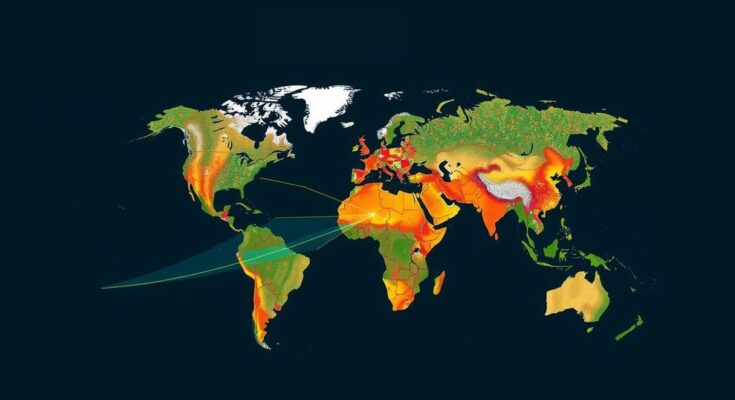The UNFCCC reveals that national climate pledges are only expected to reduce global emissions by 2.6 percent by 2030, far below the required 43 percent to meet the Paris Agreement goal of limiting temperature rise to 1.5 degrees Celsius. Upcoming COP29 negotiations will seek to establish more ambitious pledges and financial mechanisms to assist developing countries in their climate efforts.
The United Nations Framework Convention on Climate Change (UNFCCC) has reported that the current climate commitments from nations are significantly inadequate to meet the necessary goals for limiting global warming. According to their recent assessment, national pledges, referred to as nationally determined contributions (NDCs), would only achieve a mere 2.6 percent reduction in emissions by 2030, which is an increase from last year’s estimate of 2 percent. However, this contrasts starkly with the scientifically recommended reduction of 43 percent necessary to align with the Paris Agreement’s target of capping temperature increases at 1.5 degrees Celsius. UNFCCC executive secretary Simon Stiell emphasized the insufficiency of current plans, stating, “Current national climate plans fall miles short of what’s needed to stop global heating from crippling every economy and wrecking billions of lives and livelihoods across every country.” He indicated that nations are expected to submit new and more robust NDCs by February of the following year. Notably, the upcoming COP29 climate talks in Baku will serve as a platform for countries to enhance their pledges and devise a more effective emissions trading system along with a substantial financial package to support developing nations in attaining their climate objectives. Furthermore, a separate report by the World Meteorological Organization (WMO) disclosed that greenhouse gas concentrations have risen at an unprecedented rate over the last two decades, with carbon dioxide levels increasing by 11.4 percent in that span. The WMO highlighted the urgency of this issue, as most elements contributing to this rise have devastating implications for global climate conditions. The United Nations Environment Programme (UNEP) has reinforced the sentiment of a disconnect between what nations have vowed and what must be realized to adhere to the commitments outlined in the 2015 Paris Agreement, thereby warranting attention from global leaders.
The topic of climate pledges and global warming involves the commitments made by nations, through their NDCs, to reduce greenhouse gas emissions. The 2015 Paris Agreement sought to encourage countries to aim for substantial reductions in emissions to maintain global temperature increases below 2 degrees Celsius and, ideally, 1.5 degrees Celsius. The effectiveness of these pledges directly affects global climate conditions, extreme weather events, and overall ecological health. The UN’s assessments serve as critical indicators of progress—or lack thereof—in these global efforts.
In conclusion, the current climate pledges made by nations are alarmingly insufficient, achieving only a slight reduction in emissions compared to what is necessary to combat climate change effectively. With the pressing deadline for new and more ambitious NDCs approaching, the upcoming COP29 climate talks in Baku will be pivotal in determining the world’s course towards meeting the Paris Agreement targets and addressing the escalating climate crisis.
Original Source: www.aljazeera.com




